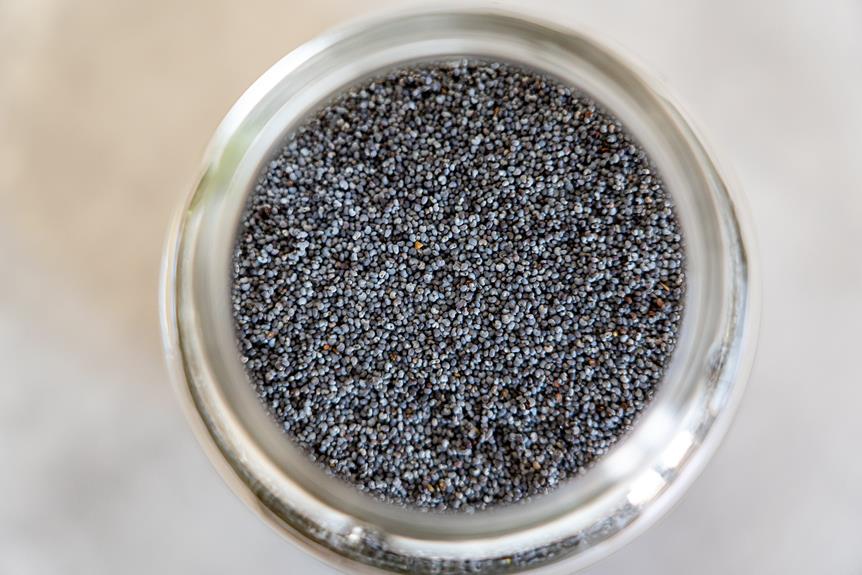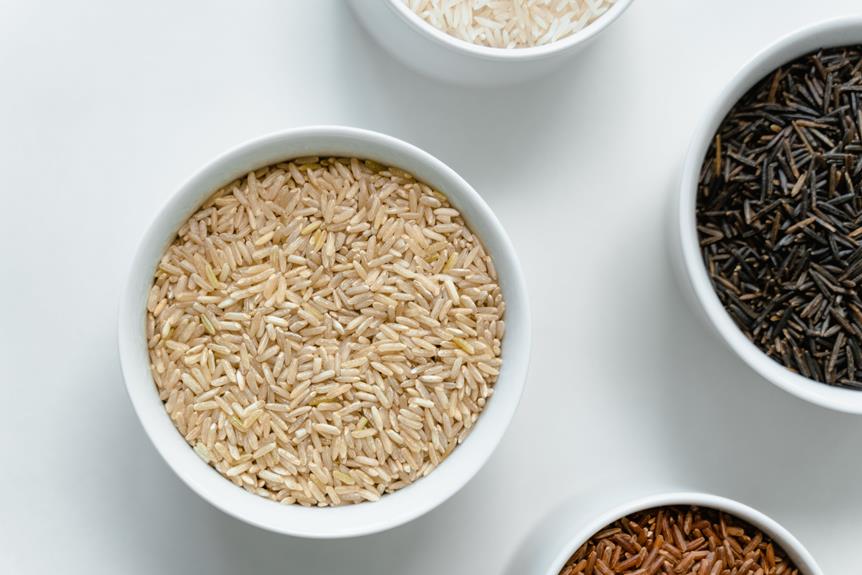Imagine your digestive system as a well-oiled machine, efficiently breaking down and absorbing nutrients, while eliminating waste effortlessly. Now, imagine if there was a secret ingredient that could enhance this process, ensuring optimal digestive health. Well, there is, and it's called fiber. But how exactly does fiber work its magic? And why is it so important for your overall well-being? In this guide, we will unravel the mysteries of fiber and show you how it can transform your digestive health, leaving you feeling lighter, more energized, and ready to take on the day. Stay tuned to discover the incredible benefits of fiber and how you can incorporate it into your daily routine.
Key Takeaways
- Fiber promotes regular bowel movements and prevents digestive issues.
- Soluble fiber regulates blood sugar and cholesterol levels for optimal digestive health.
- Including a variety of fiber-rich foods supports a healthy gut microbiota and overall well-being.
- Gradually increasing fiber intake and staying hydrated aids digestion when consuming more fiber.
The Role of Fiber in Digestive Health
Fiber plays a vital role in maintaining a healthy digestive system. It acts as a broom, sweeping through your digestive tract and keeping everything moving smoothly. Think of it as the superhero of your gut, fighting off constipation and promoting regular bowel movements. By adding fiber to your diet, you can prevent many common digestive issues and improve your overall gut health.
One of the main benefits of fiber is its ability to add bulk to your stool. This helps prevent constipation by making it easier for waste to move through your intestines. Without enough fiber, your stool can become hard and difficult to pass, leading to uncomfortable and painful bowel movements. By including fiber-rich foods in your diet, such as whole grains, fruits, and vegetables, you can ensure that your digestive system stays regular and efficient.
Fiber also plays a key role in maintaining a healthy balance of gut bacteria. Your gut is home to trillions of bacteria, both good and bad. The good bacteria help break down food and absorb nutrients, while the bad bacteria can cause inflammation and digestive problems. Fiber acts as a prebiotic, providing nourishment for the good bacteria and helping them thrive. This can reduce the risk of conditions like irritable bowel syndrome and promote a healthy gut environment.
In addition to its role in digestion, fiber can also help regulate blood sugar levels and cholesterol levels. Soluble fiber, found in foods like oats and legumes, forms a gel-like substance in your intestines that slows down the absorption of sugar and cholesterol into your bloodstream. This can help prevent spikes in blood sugar and lower your risk of heart disease.
Types of Dietary Fiber and Their Effects
To better understand the role of fiber in digestive health, it is important to explore the different types of dietary fiber and how they affect your body. Dietary fiber can be classified into two main types: soluble fiber and insoluble fiber. Both types play important roles in supporting healthy digestion and promoting overall well-being.
Soluble fiber dissolves in water and forms a gel-like substance in your digestive system. This type of fiber helps to slow down the absorption of sugars, which can help regulate blood sugar levels. Soluble fiber also aids in lowering cholesterol levels by binding to cholesterol particles and removing them from the body. Good sources of soluble fiber include fruits, vegetables, legumes, and oats.
On the other hand, insoluble fiber does not dissolve in water and adds bulk to your stool, promoting regular bowel movements. This type of fiber helps prevent constipation and keeps your digestive system running smoothly. Insoluble fiber also provides a feeling of fullness, which can assist in weight management. Whole grains, nuts, seeds, and the skins of fruits and vegetables are rich sources of insoluble fiber.
By incorporating a variety of foods that contain both soluble and insoluble fiber into your diet, you can reap the benefits of both types. The table below provides examples of foods that are high in each type of fiber, along with their effects on your body.
| Soluble Fiber | Effects |
|---|---|
| Fruits | Regulates blood sugar |
| Vegetables | Lowers cholesterol |
| Legumes | |
| Oats | |
| Insoluble Fiber | Effects |
| Whole grains | Promotes regular bowel movements |
| Nuts | Prevents constipation |
| Seeds | Assists in weight management |
| Skins of fruits and vegetables | Provides a feeling of fullness |
How Fiber Supports Healthy Digestion
Incorporating fiber into your diet plays a crucial role in maintaining healthy digestion. Fiber acts as a broom, sweeping through your digestive system and keeping things moving smoothly. It adds bulk to your stool, making it easier to pass and preventing constipation. By promoting regular bowel movements, fiber helps to prevent and alleviate digestive issues such as bloating, gas, and abdominal discomfort.
One of the main benefits of fiber is its ability to regulate blood sugar levels. Soluble fiber, found in foods like oatmeal, beans, and fruits, slows down the absorption of sugar into your bloodstream. This helps to prevent spikes in blood sugar and can be particularly beneficial for individuals with diabetes or prediabetes. By promoting stable blood sugar levels, fiber also helps to control cravings and maintain a healthy weight.
Furthermore, fiber acts as a prebiotic, providing fuel for the beneficial bacteria in your gut. These bacteria, known as gut microbiota, play a crucial role in digestion and overall health. By nourishing these bacteria, fiber helps to maintain a balanced gut microbiome, which is essential for optimal digestive function.
Another important role of fiber in digestion is its ability to promote satiety. High-fiber foods take longer to chew and digest, keeping you feeling fuller for longer. This can help to prevent overeating and promote weight management.
Incorporating fiber into your diet is relatively easy. You can increase your fiber intake by including more whole grains, fruits, vegetables, legumes, and nuts in your meals. Aim for a variety of fiber-rich foods to ensure you get a good mix of soluble and insoluble fiber.
The Importance of Fiber for Gut Microbiota
Nourishing your gut microbiota, fiber plays a vital role in maintaining optimal digestive function. The health and diversity of your gut microbiota are crucial for overall well-being, and fiber acts as a powerful ally in supporting a thriving microbial community. Here's why fiber is so important for your gut microbiota:
- Promotes the growth of beneficial bacteria: Fiber serves as a source of nourishment for the beneficial bacteria in your gut. These bacteria ferment fiber, breaking it down into short-chain fatty acids (SCFAs) such as butyrate, acetate, and propionate. SCFAs play a key role in maintaining a healthy gut environment and supporting the growth of beneficial bacteria.
- Enhances microbial diversity: Consuming a variety of fiber-rich foods can help increase the diversity of your gut microbiota. A diverse microbiota is associated with better overall health and a lower risk of certain diseases. By providing different types of fiber, you can support the growth of a wide range of beneficial bacteria.
- Improves gut barrier function: Fiber helps strengthen the integrity of the gut barrier, which acts as a protective barrier between the contents of your intestines and the rest of your body. A healthy gut barrier prevents harmful substances from leaking into the bloodstream and causing inflammation. Fiber promotes the production of mucus and supports the growth of gut-friendly bacteria, both of which contribute to a strong gut barrier.
Tips for Increasing Fiber Intake
Looking to boost your fiber intake? Here are some tips to help increase your dietary fiber.
| Food Group | High-Fiber Foods | Serving Size |
|---|---|---|
| Fruits | Apples, pears, berries | 1 medium fruit |
| Vegetables | Broccoli, carrots, spinach | 1 cup cooked |
| Grains | Oats, quinoa, brown rice | 1/2 cup cooked |
| Legumes | Lentils, black beans | 1/2 cup cooked |
| Nuts and Seeds | Almonds, chia seeds | 1 ounce |
- Gradually Increase Consumption: Start by adding small amounts of high-fiber foods to your meals and snacks. Slowly increase the portion sizes over time to allow your body to adjust.
- Choose Whole Grains: Opt for whole grain bread, pasta, and cereals instead of their refined counterparts. Whole grains retain more fiber and nutrients.
- Include Fruits and Vegetables: Add a variety of fruits and vegetables to your meals. Experiment with different types and colors to ensure a diverse range of fiber sources.
- Snack on Nuts and Seeds: Keep a stash of nuts and seeds on hand for a fiber-rich snack option. Sprinkle them onto salads, yogurt, or enjoy them on their own.
- Cook with Legumes: Incorporate legumes like lentils, chickpeas, and black beans into your meals. They are not only high in fiber but also a great source of plant-based protein.
Remember to drink plenty of water when increasing your fiber intake to prevent constipation. Aim for a gradual increase over time to allow your digestive system to adapt. By incorporating these tips into your diet, you can easily boost your fiber intake and improve your digestive health.
Frequently Asked Questions
How Much Fiber Should I Consume Daily for Optimal Digestive Health?
For optimal digestive health, how much fiber should you consume daily? Fiber plays a crucial role in promoting good digestion. It helps to regulate bowel movements, prevent constipation, and maintain a healthy gut. The recommended daily intake of fiber varies depending on your age and gender. However, on average, adults should aim to consume around 25 to 30 grams of fiber per day. This can be achieved by incorporating foods like fruits, vegetables, whole grains, and legumes into your diet.
Can Fiber Help Prevent or Relieve Symptoms of Constipation?
Fiber can absolutely help prevent and relieve symptoms of constipation. It adds bulk to your stool, making it easier to pass through your digestive system. By promoting regular bowel movements, fiber keeps everything moving smoothly and prevents the buildup of waste in your intestines. Including fiber-rich foods in your diet, such as fruits, vegetables, and whole grains, can help keep constipation at bay and promote overall digestive health.
Are There Any Risks or Side Effects Associated With a High Fiber Diet?
Are there any risks or side effects associated with a high fiber diet? Yes, there can be a few. When you increase your fiber intake too quickly, it might cause bloating, gas, or abdominal discomfort. It's important to gradually increase your fiber intake and drink plenty of water to avoid these issues. Additionally, if you have any underlying digestive conditions like irritable bowel syndrome or Crohn's disease, a high fiber diet might exacerbate symptoms. It's always best to consult with a healthcare professional before making any significant dietary changes.
What Are Some Good Sources of Soluble and Insoluble Fiber?
Some good sources of soluble fiber include fruits like apples and oranges, as well as vegetables like carrots and broccoli. On the other hand, sources of insoluble fiber include whole grains like wheat and oats, as well as nuts and seeds. These foods can help improve your digestion and keep your digestive system healthy. Remember to drink plenty of water when consuming fiber to ensure it works optimally in your body.
Can Fiber Help With Weight Management and Reducing the Risk of Certain Diseases?
Fiber can definitely help you manage your weight and reduce the risk of certain diseases. It keeps you feeling full for longer, so you're less likely to overeat. Plus, it helps regulate blood sugar levels and lowers cholesterol, reducing the risk of diabetes and heart disease. With the added bonus of promoting healthy digestion, fiber is an essential component of a balanced diet. So make sure to include plenty of fruits, vegetables, whole grains, and legumes in your meals.




